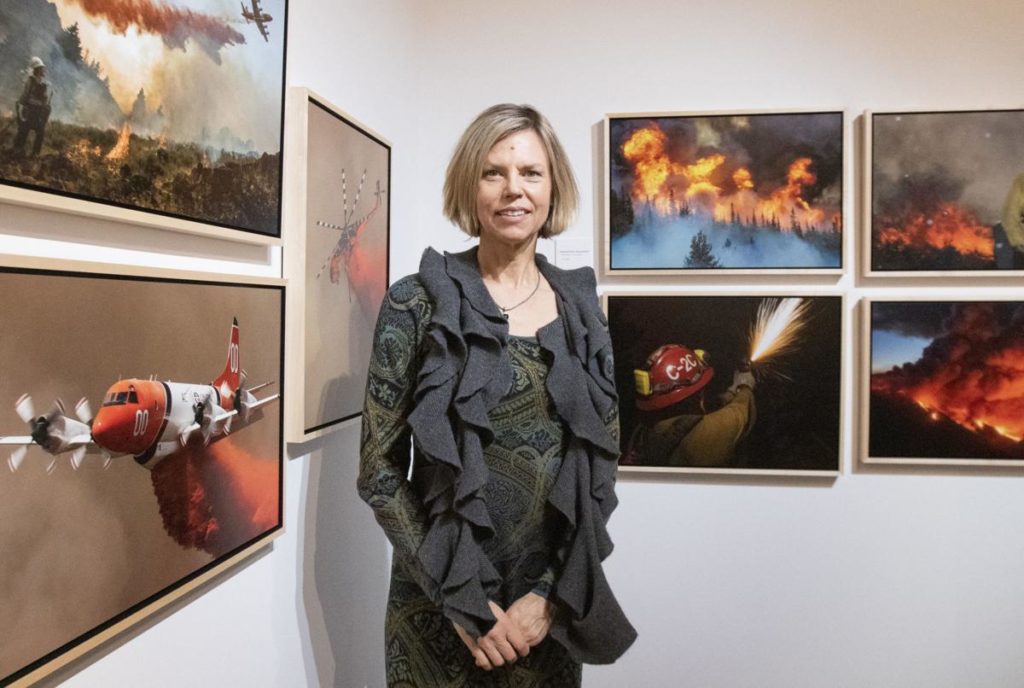Artists often find ways to incorporate current events, important issues and personal passions into their work as a way of expressing ideas and opinions. Moscow’s art scene is no exception to this as local creators convey their thoughts on climate change, a hot-button topic that is becoming more prevalent in media coverage, entertainment, and culture as time goes on.
According to their website, Moscow Contemporary is “a new arts and education non-profit presenting the best in contemporary art and arts educational services to the communities surrounding Moscow, Idaho.”
This organization was “formed by the core belief that arts fundamentally express our shared humanity and generate new perspectives to build a better future,” as described in their mission statement.
Moscow Contemporary offers exhibits that display the work of local, regional, national and international artists with the objective of including a diversity of perspectives that reflect on the richness of the world.
These works include “Facing the Inferno”, a wildlife photography exhibit from Kari Greer that will be displayed from Nov. 19 of this year to Jan. 22 of 2022.
Greer is a photographer for the National Interagency Fire Center based in Boise, Idaho, specializing in wildland fire photography and editorial photojournalism, according to her Moscow Contemporary biography. Also included is her interest in wildland fire photography that began in college, when she worked on a Forest Service fire crew in Washington’s Gifford-Pinchot National Forest.
Her gallery, “Facing the Inferno,” seeks to shed light on the fact that wildfires have become increasingly threatening to our environment and communities on a national, and even global, level.
“The increasing length and severity of the fire season makes this project timely and important,” the gallery description stated. “Scientists comprehend what it means to live in a fire environment, including when to suppress, contain or let fires burn. The goal of this project is to help propel an even broader understanding and public conversation of this volatile dynamic.”
As well, Moscow Contemporary will be displaying “Sap in their Veins”, a photography and oral history exhibit by David Paul Bayles that does not yet have an exhibition date.
According to his biography, Bayles “focuses on landscapes where the needs of forests and human pursuits often collide, sometimes coexist and on occasion find harmony. Some of his projects utilize a documentary approach while others use a more contemporary art practice.”
He has a personal commitment to environmentalism and believes his dual perspectives as a logger and an environmentalist adds an authentic and unique approach to his photographic projects.
Bayle considers this exhibit relevant and important because the photography portrays current divisions in our culture, hopefully resolved by the power of stories which reflect our shared humanity to help bridge those divides.
This exhibit details the “Spotted Owl Wars,” a conflict in which “rural logging communities were fighting to protect their often multi-generational way of life, and urban environmentalists were fighting to stop logging of all old growth timber and the practice of clear cutting,” according to the gallery’s description.
This gallery touches on multiple perspectives of environmental sustainability, as well as personal traditions and livelihood, a stark contrast to Greer’s strong preservation perspective achieved in “Facing the Inferno.”
An excerpt from one of the oral history sections of the exhibit personalizes this point of view.
“Loggers are very concerned about the woods and environment. We make our living there and love the woods and timber in such a deep way that I doubt I could ever describe it to you or to anyone,” the text states. “It’s a feeling I get when in the woods that can only be described as close to a deep religious experience. I feel so close to my creator when in the woods and the very life of the timber seems to indwell my peace and presence.”
Beyond photography exhibits concerning wildfires or logging with Moscow Contemporary, artists also engage in environmental commentary through the Prichard Gallery.
According to their informational page, Prichard is “dedicated to giving artists the freedom and support the need to fulfill their vision for what an exhibit of their work should be. (They) believe that by nurturing the presentational aspirations of the artist, the best possible experience is created for (their) many audiences.”
The most recent gallery displayed in Prichard was “Palouse Plein Air”, an annual painting competition held each September. The event is organized by the Moscow Arts Commission and hosted by Moscow Contemporary. This year, the theme of the competition focused on the impressions of artists of the Palouse, the rolling hills and landscapes familiar to Idahoans and eastern Washingtonians.
Although the exhibit for this year has ended, the results and winners are available to view on their website. Winning artistic themes included sunsets, hay waves, wanderers, mountains, botanical gardens and other quintessential staples of the Palouse.
“Historic Moscow, Idaho and the beautiful Palouse are the perfect destination for plein air artists, and the annual Palouse Plein Air painting event connects artists with the region’s landscape and arts culture,” according to their informational page. “French for “open air,” the phrase “plein air” describes the act of painting outdoors. The outdoor experience on the Palouse is particularly rich, as its rolling hills, rivers, mountains, fields, farms and homes tell the long history of the landscape.”
As all artists tell their own unique story and perspective of climate change and the unknowns the situation presents, a unifying theme throughout all work is the love and appreciation of the world we have and desperately wish to preserve.
Whether through photography, oral history or the use of countless physical mediums, artists are a strong voice in our communities with valuable perspectives and work that desire to be heard.
Katarina Hockema can be reached at arg-life@uidaho.edu or on Twitter @kat_hockema

Al Poplawsky
Great, well written story. Thanks!